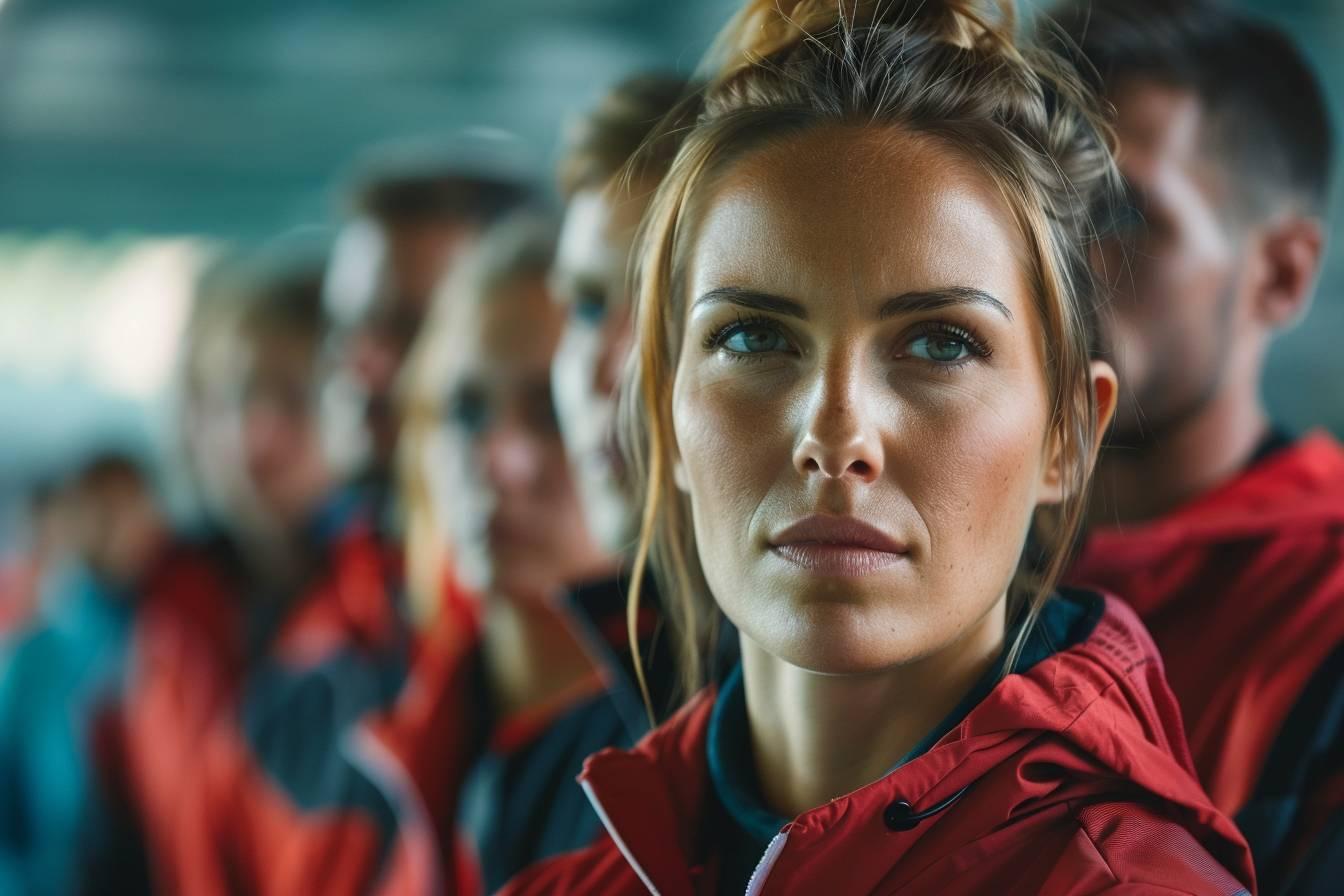🤸 To sum up :
Women coaching men’s sports face unique challenges but bring valuable perspectives to the field. Here’s what you need to know :
- Underrepresentation : Only 3% of head coaches in men’s sports are women
- Key challenges : Questioning of qualifications, limited opportunities, lack of respect, and unequal pay
- Motivation : Passion for sports and desire to challenge stereotypes
- Strategies for success : Continuous learning, building support networks, and focusing on results
- Future outlook : Promising, with growing recognition and initiatives for gender equality in sports
In the world of sports, women coaching men’s teams remains a rarity. Despite progress in gender equality, female coaches face numerous challenges when leading male athletes. As passionate sports enthusiasts, we understand the importance of diverse perspectives in coaching. Let’s explore the hurdles women encounter in this field and how they can overcome them. 🏋️♀️🏆
Trailblazers : Breaking barriers in men’s sports
Women coaching men’s sports are true trailblazers, paving the way for future generations. However, their journey is far from easy. Only 3% of head coaches in men’s sports are women, highlighting the significant underrepresentation in leadership positions. This statistic reflects the deeply ingrained gender stereotypes and societal norms that persist in the sporting world.
As a fitness coach with a passion for football and other ball sports, I’ve witnessed firsthand the challenges faced by female coaches. The perception that sport is a masculinized entity often leads to women being viewed as intruders in male-dominated spaces. This mindset creates barriers that are difficult to overcome.
Some of the key challenges women face when coaching men’s sports include :
- Constant questioning of qualifications and knowledge 🧠
- Limited exposure and opportunities for advancement 📊
- Lack of respect from male athletes 🏅
- Unequal pay and resources compared to male counterparts 💰
Despite these obstacles, many women have successfully broken through, demonstrating their expertise and leadership skills. Their perseverance and dedication are reshaping the landscape of men’s sports coaching.
Why coach the other sex ? Insights and motivations
You might wonder why women choose to coach men’s teams despite the challenges they face. The answer lies in their passion for sports and their desire to make a difference. Many female coaches see this as an opportunity to challenge stereotypes and prove that coaching ability is not gender-specific.
Coaching men’s sports allows women to :
- Showcase their expertise and tactical knowledge
- Bring fresh perspectives to traditionally male-dominated environments
- Inspire other women to pursue leadership roles in sports
- Challenge societal norms and expectations
As someone known for perfectionism and attention to detail in sports training, I can attest to the value of diverse coaching styles. Women often bring unique approaches to communication, team-building, and strategy that can greatly benefit male athletes.
However, the path to success is not without its obstacles. Female coaches must navigate complex power dynamics and male-dominated networks. The existence of an “old boys network” often limits opportunities for women, making it crucial for them to build their own support systems and mentorship relationships.
| Challenge | Impact | Potential Solution |
|---|---|---|
| Underrepresentation | Limited role models for aspiring female coaches | Implement mentorship programs and visibility initiatives |
| Stereotypes and bias | Questioning of abilities and expertise | Education and awareness programs for athletes and administration |
| Unequal resources | Hindered career advancement | Advocacy for equal pay and resource allocation |

Diving in : Overcoming challenges and achieving success
For women to succeed in coaching men’s sports, it’s crucial to adopt strategies that address the unique challenges they face. Developing a thick skin and maintaining unwavering confidence are essential qualities for female coaches in this environment.
Here are some effective approaches for women coaching men’s teams :
- Continuously update and showcase your knowledge and expertise 📚
- Build a strong support network of mentors and allies 🤝
- Address stereotypes and biases head-on through open communication 🗣️
- Focus on results and performance to gain respect from athletes and administration 📈
It’s worth noting that 85.3% of national Olympic governing bodies have all-male leadership teams. This statistic underscores the importance of women pushing for change at all levels of sports administration. By actively seeking leadership positions and advocating for diversity, female coaches can help create a more inclusive environment for future generations.
As we strive for excellence in our respective sports, it’s crucial to recognize the value that diverse perspectives bring to coaching. The technical precision and competitiveness that drive us should be channeled into supporting and empowering female coaches in men’s sports.
Eye on the ball : The future of women coaching men’s sports
While the current landscape presents numerous challenges, the future of women coaching men’s sports is promising. Increased awareness and advocacy for gender equality in sports are paving the way for more opportunities and support for female coaches.
Some positive developments include :
- Growing recognition of the unique skills women bring to coaching 🌟
- Initiatives to increase representation in leadership positions 📊
- Mentorship programs connecting experienced female coaches with aspiring ones 🤝
- Media campaigns highlighting successful women in men’s sports coaching 📺
However, there’s still work to be done. Addressing implicit biases in hiring processes, ensuring equal pay and resources, and creating supportive work environments are crucial steps in fostering a more inclusive sports culture.
As we look to the future, it’s important to remember that change starts with us. By championing female coaches, challenging stereotypes, and promoting diversity in sports leadership, we can create a more equitable playing field for all. Let’s keep our eye on the ball and work together to break down barriers and celebrate the invaluable contributions of women in coaching men’s sports. 🏆🌈



